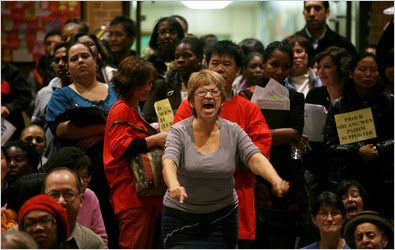Schools slated for closure -- resulting from the failure of the administration's policies
Interesting that some parents in NYC can be so much stronger, analytical and educational than the union supposedly defending educators.
The UFT/AFT, hungering for recognition as a "reformist" minded union over the last 25 years, has never taken a strong stand over the closing of schools. Oh you have heard stuff like "Let’s invest money and resources into our existing schools and make them better. It can be done." But it has all been lip service. No line in the sand demanding that things like reduced class size be attempted before closing schools and adding real support for kids who are struggling academically and personally.
The ATR situation (mostly created by closing schools), exacerbated by the UFT's abandonment of the seniority system and promotion of the Open Market System, along with the other attacks on teachers from all directions, has created an internal pressure cooker within the UFT.
The two most prominent school closing announcements this past week were those of Maxwell HS just a few blocks north of my alma mater, the now broken up Thomas Jefferson HS on Pennsylvania Ave in East NY and Jamaica HS in Queens, long in the news through the efforts of chapter leader James Eterno, who will be running against Mike Mulgrew for UFT president.
A few conspiracy theorists have linked the closing as a backroom deal between the UFT and the DOE to put Eterno in a position of having to defend his school instead of being out campaigning, but Eterno has consistently said that the UFT has been supportive in his efforts. I don't always agree with James on this point as I look for deeds more than words.
See Chaz School Daze post and comments on the closing of Jamaica, where he, a former teacher at Jamaica says:
when I left the school was already struggling to survive the inept Principals running the school into the ground and their bosses who found any excuse to attack the school.
Only, James Eterno stood in the way between the dismantling of Jamaica HS earlier. However, unless Michael Mulgrew puts the power of the UFT into this fight, I hold no hope for Tweed reversing their decision.
we need to get rid of Leo Casey as HS rep. Many CL's have more serious school issues to deal with than hear from a union lackey with his double pension that supported the 2005 contract disaster and insulted critics who were proven right about he damage that contract did to us.
We already know that James Eterno is as good a chapter leader as you could find and we in ICE will do what it takes to assist him in this battle, which takes priority at this time over the UFT elections.
Ed Notes has been a persistent critic over the last 15 years of UFT policy towards closing schools and the entire baggage that goes with is: using test data to punish and reward and evaluate teachers and schools. I don't think the UFT can suddenly change its stripes and fight back in an effective way unless it mobilizes in a vast and consistent (no one-shot candle light vigils for instance) manner on all levels, including politically.
The Maxwell HS situation, where the activist Seung OK from GEM and ICE teaches, is an interesting case in point. It is one of the few vocational schools left and we certainly need these more than ever. Maxwell is the home of UFT District Rep Charlie Turner, one of the most despicable hacks in the union. We'll come back to that later.
The UFT has decided to make a big deal out of Maxwell, as indicated in this letter I posted on Norms Notes from special rep Anthony Sclafani that went out to chapter leaders cancelling their meeting this Wednesday and urging them to go to a rally at Maxwell instead. There is an urgency in the letter that might lead some to believe this is a sea change in how the UFT will respond in the future. I'm not so sure.
It begins with:
"Wednesday’s Chapter Leader Meeting is cancelled. That’s right. You have to feed yourself on Wednesday, December 9th."
That's a pretty arrogant way to start, with a demo of union hack resentment over having to feed people to get them to a meeting. But let's give Tony the benefit of the doubt and call it a bad attempt at humor. He continues:
The three of us, [Brooklyn HS District reps Charley [Turner], Charlie [Friedman] and I are taking this very seriously, especially Charley Turner since this is his school We are concerned about many things and some of these will affect you and your schools.
Well, now, Charlie Turner never seemed too upset when Tilden and Canarsie HS, not far from Maxwell and whose extra kids ended up putting pressure on Maxwell that may be a factor in giving the DOE an excuse to close it. But Turner and so many other UFT hacks never see a picture bigger than their next check. A teacher at Tilden left this comment at the ICE blog:
the staff fought back against the Principal and the D.O.E. but like Carnarsie H.S. where they kicked Charlie Turner out of the building when he came over there to comfort the Carnarsie Staff by telling them that you're lucky all you ATRS have jobs. "So what if they move you to another school which you have no choice in going and that it is usually an undesirable school. So what that you are forced to teach out of your licenced area! So what if you have taught at Carnarsie and Tilden for over 20 years. You're lucky. Randi and I(Charlie Turner) and her unity pals signed a great contract in 2005 so you still have jobs as ATRS. Well Charles Turner regretted those words and never stepped foot at Canarsie or Tilden again!
But let's get back to Tony's letter, which actually has nuggets of stuff that's pretty decent.
He defends Maxwell:
...statistically, Maxwell has been on a steady road to improvement over the past three years. We can prove that.....the grading system that determined this is flawed, as everyone in education agrees.
Then Tony asks the magical question:
where will the overflow go? Jefferson Campus? Madison? Wingate Campus? Transit Tech? School for the Classics? Lane Campus? Wherever these students go, it will have an effect on these schools since there is no one being admitted into Maxwell.
Yes, where will the overflow go? That question has been asked time and again but has been basically ignored by the UFT as almost all the large high schools in central and southeast Brooklyn have been closed down and organized into much smaller schools that can't or won't take the overflow.
Next, Tony hits another magic button
I believe that this closing is for one reason and one reason only – SPACE. Where else do we put those new Charter Schools? Or better yet, where do we create empty space to justify new Charters somewhere down the road?
Whoa. Guess what two charter schools are within a stones throw of Maxwell? Both UFT charter schools, with the middle school based at George Gershwin (IS 166 - also my alma mata) possibly one day expanding to 9th grade and beyond. Could it, would it....nah, even in bizarro land we would never see a UFT charter occupying space in Maxwell.
Now Tony hits his stride with some really good stuff:
who’s next on the chopping block? Flawed data, fake reasons, a determined philosophy to close large comprehensive high schools at any cost – all these excuses can be used against anyone of you , even some of the smaller schools. Let’s invest money and resources into our existing schools and make them better. It can be done.
Yes, Tony, it can be done. But never without a union putting its full force behind the battle.
See the document Seung Ok put together to be used in the defense of Maxwell at the GEM blog. Download the pdf to share with your colleagues.
WH Maxwell VHS-Injustice of School Closures
Text posted at NYC Public School Parent blog:The case for keeping Maxwell Vocational HS open
Postscript:The actions of Unity Caucus hacks undermine the ability of the UFT to galvanize the support needed to fight these battles because without trust in the leadership to engage in a fair process, the most active members who are also critics tend to hold back their support.
Yes, democracy does count in building an effective union and until we see signs the internal battles will rage. Mulgrew has not only not shown signs of reigning in the hacks but there are indications he will go in the other direction. Let's see how dirty they get in the elections.
I'll write more about this soon because we see what seems like a seductive (to a few) New Action line that we all have to unite to battle the common enemy BloomKlein popping up. Many of us see the UFT/AFT more often lined up with that enemy than with the members. My simple response it to call on Mulgrew to begin a democratic reformation of the union in a show of faith. GEMers and ICEers will be holding discussions addressing the issue of what such a reform might look like in the next few months.


